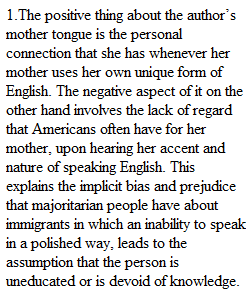


Q Read Amy Tan’s “Mother Tongue” (page 379, 6th). First answer question number 2, which asks you to write about the positive and negative effects of Tan’s mother’s language on the author. You can use a paragraph or even a table or other graphic organizer to share your thoughts. After that, think about this class and what you have learned. Have you learned anything about how the English language is more complicated and more layered than you assumed? Have you learned how reading a passage a second or third time or with a different focus in mind (or with the input of others) can reveal other meanings, deeper meanings, ideas you may have missed? Share one example too. (100 points) Second, write at least 8 lines (one or two paragraphs) that answer question number 4. Consider the idea of code switching, perhaps, or how you talk in class versus how you talk to your siblings. How you write versus how you speak? How you talk after a couple beers in the seats of the 700 level of Lincoln Financial Field? Ebonics, as it was once called? Something similar to Amy Tan if English is your second language or the second language of your family? Plenty of blue-collar aint’s and profanity? Don’t forget to dive into the meaning of your examples and how they affect your life. (100 points). These responses can be 8 to 10 lines. Keep it brief and to the point unless you have more to say.
View Related Questions